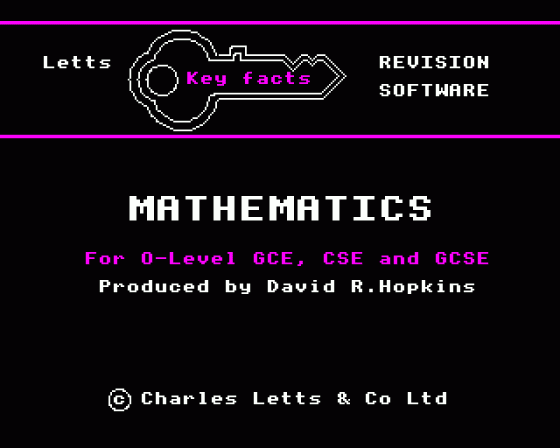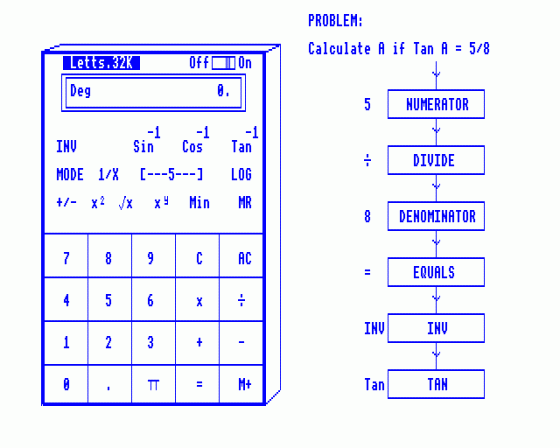


| Genre: | General: Education |
| Publisher: | Letts |
| Cover Art Language: | English |
| Machine Compatibility: | BBC Model B, BBC Model B+, BBC Master 128, Acorn Electron |
| Release: | Professionally released on Cassette |
| Available For: | BBC/Electron & Spectrum 48K |
| Compatible Emulators: | BeebEm (PC (Windows)) PcBBC (PC (MS-DOS)) Model B Emulator (PC (Windows)) Elkulator 1.0 (PC (Windows)) |
| Original Release Date: | 1st January 1984 |
| Original Release Price: | £9.99 |
| Market Valuation: | £2.50 (How Is This Calculated?) |
| Item Weight: | 64g |
| Box Type: | Cassette Single Plastic Clear |
| Author(s): | David R. Hopkins |
Variant Items
There is 1 other item featuring this same game (that we know about!). Click any of them for their details.
Active Auctions
Closed Auctions
Buy It
Unfortunately no-one is currently selling this item.
Auction Price Watch
Worried you're being ripped off? Closing prices on eBay can help you decide what a reasonable price is for a particular item.
Components
This item originally came with the following components:
- Instruction Manual
If scans of components are available, you will find them in the Cover Art section.
Full Instructions
How To Use The Programs In A Revision Scheme
The programs on this double-sided disk have been devised to make your revision more approachable and enjoyable. Organisation is the key to making the most of your revision time. For each subject follow these simple rules.
- Know your syllabus. A quick reference to the relevant syllabus analysis table to be found at the front of Letts Study Aids Revise series is advised.
- Devise a timetable, as soon as the Mocks are over, which will allow you to go through the syllabus at least twice (more for problem area).
- For each topic, read all your available material - class notes and textbooks. Make summary notes as you go, then test yourself. Keyfacts Multiple Choice of Letts Study Aids Objective Questions will give invaluable practice and help. Finally, run the relevant computer program which will both test your knowledge and give you another perspective.
- Just before the examination, use all your summary notes to jog your membry and the whole subject program suite to reinforce your understanding.
The mathematics suite comprises:
- a summary of important theory points
- screen demonstrations where the 'visual medium' is fully exploited e.g. calculator sequences
- user interaction where the power of the computer is under user-control e.g. graphics
- several quizzes on common core topics (randomised) where the computer marks answers and demonstrates correct solutions step by step
- a one hour trial-examination to highlight 'problem areas'
The programs bring mathematical processes 'to life' in a stimulating way and have been designed to give you deeper insight into a wide range of topics - therefore helping you to master the difficult concepts involved.
The Programs
Disk 1
A1 Calculator
B1 Arithmetic Quiz
C1 Algebraic Quiz
D1 Geometry Quiz
E1 Constructions
F1 End
Disk 2
A2 Pythagoras/Bearings
B2 Sin/Cos/Tan & Rules
C2 Lines/Quadratics
D2 Transformations
E2 Exam
F2 End
The Programs
A1 Calculator
The first screen displays a menu.
1. Layout of a calculator
2-6. Solving important problems
You are invited to select.
The more important features of a typical calculator are explained with the user of the Letts 32K model - which is displayed on the screen.
Six important problems (which may be solved using a calculator) are demonstrated using, again, the Letts model and incorporating flowcharts. The calculator display is shown working realistically during the demonstration and you may practise on your own calculator at the same time.
B1 Arithmetic Quiz
The quiz format allows you to try each of the randomised questions and/or watch the computer solving the problem and setting out the answer properly. You will have the additional option of seeing the correct calculator sequence displayed on the screen in flowchart form (where appropriate).
The computer will mark your answer to each question. Helpful on-screen instructions are available at all times and you will be able to use the quiz for as long (or as often) as you like.
All the important arithmetical processes from the 16+ syllabuses are included and you should have pencil/paper/calculator available for your written solutions.
C1 Algebraic Quiz
A menu is displayed from which you make a choice to try one of the ten mini-quizzes on the main algebraic topics and problem areas found in 16+ syllabuses.
Helpful on-screen instructions are available at all times and each of the questions is randomised so that you can practise 'problem areas' over and over again until you've mastered all the techniques involved.
Each quiz allows you to try the questions yourself and enter your answer and then you are given the option to see the solution set out correctly by the computer.
The ten mini-quizzes are:
- Sorting terms
- Substitution
- Indices
- Simple equations
- Simultaneous equations
- Expansion of brackets
- Factorisation
- Quadratic equations
- Algebraic fractions
- Venn diagrams
D1 Geometric Quiz
The quiz format is identical to programs 2 and 3 and is fully randomised so that you may use it over and over again to master the important geometric properties/theorems covered.
The computer will mark your answers to the questions and/or solve the problems, showing you how to set out the solutions properly.
You should have a pencil/paper/calculator for your solutions and the computer has been programmed to mark your answer correct to one decimal place (where applicable).
E1 Constructions
The first screen invites you to choose either:
- Constructions
-
Triangles/Quadrilaterals
The computer will demonstrate the following constructions faithfully on the screen:
- 60°
- 90°
- Bisector of an angle
- Perpendicular bisector of a line
- Perpendicular onto a line
- Parallel line
The second section (scale drawings) uses randomised constructions of a triangle or a quadrilateral. You may try the constructions yourself (the computer will mark your answers) and/or see the rough sketch and 'accurate' version which the computer draws on the screen.
A2 Pythagoras/Bearings
The first screen displays a menu:
- Theorem of Pythagoras
- Quiz - Pythagoras
- Check your bearings
- Scale drawings
You are invited to make a selection.
The theorem of Pythagoras is explained and the quiz involves random questions which you may solve yourself (the computer checks your answers) and/or see the problem worked out in the correct sequence.
Bearings are randomly drawn on the screen and the computer shows you the compass and three figure equivalents.
Scale drawings are introduced through a practical example of a three part journey involving distances and bearings. You are invited to try the drawing yourself after checking with the computer's rough sketch. The computer then checks your readings for their accuracy. Again, the questions have been randomised.
B2 Sin/Cos/Tas & Rules
The first screen displays a menu
- Sin, cos & tan ratios
- Sin, cos & tan quiz
- Sin/cos rules for any triangle
- Sin/cos rules quiz
You are invited to make your selection from 1-4.
The trigonometric ratios of a right-angled triangle are explained and quizzed randomly in the same format as previous problems. The relevant calculator sequence is displayed on request.
The sine and cosine rules applicable to any triangle are explained in their various forms and quizzed randomly. You will be tested as to the correct choice of formula and then you can see the computer's complete solution and/or calculator sequence.
C2 Lines/Quadratics
The first screen displays a menu.
1 y = mx + c Theory/Quiz
2 y = mx + c Practical
3 Roots of ax^2+bx+c = 0
You are invited to make your selection from 1-3.
The theory of y=mx+c explains the significance of 'm' and 'c' in an easy-to-understand way.
The practical section of y=mx+c allows you to instruct the computer to draw various straight lines on the screen (you choose 'm' and 'c'). You have the option of superimposing the lines on the same axes and therefore experimenting with the effects of altering 'm' and/or 'c', or you may otherwise choose new axes for each line (you can overlay up to eight lines on the screen at any one time!)
The roots of the equation ax^2+bx+c=0 are investigated graphically and the computer plots the quadraitc of your choice (you have to enter values for a, b and c).
The computer chooses the X & Y-axis scales to show the position of the roots most clearly.
D2 Transformations
The first screen displays a menu.
- Coordinates quiz
- Vectors demonstrated
- Geometric transforms
- Reflection/rotation quiz
You are invited to make a selection from 1-4.
The coordinates quiz is designed as a multiple-choice exercise where the computer plots a random point and you have to determine its coordinates from four close alternatives.
Vectors are randomly produced by the computer and their compoents are shown. You can then see the vector as a displacement demonstrated and its magnitude worked out.
The computer produces randomly a right-angled triangle and you may choose to reflect, rotate about the origin, translate or enlarge (centre the origin) this triangle.
The reflection/rotation quiz is in the same format as previous quizzes and the computer produces a random point in the X-Y plane and gives you its coordinates. You are then asked to specify the coordinates of its image under one of a random seven transformations and the computer marks your answer. The transformation is then shown on the screen.
E2 Exam
The trial exam is based on the common core of the GCE mathematics syllabuses and involves forty searching multiple-choice questions to be completed in a maximum of one hour.
In order to simulate examination conditions as nearly as possible you should ensure that you set aside a whole hour for the completion of the examination and you will be given easy-to-follow instructions and frequent time checks throughout its duration (when there is less than 10 minutes left the screen will change colour to read as a reminder).
You will receive (at the end of the examination) a breakdown of your performance and as the questions have been randomised you will be able to use the examination several times during your preparation and revision. You may wish to sit this examination straight away in order to highlight areas of difficulty and/or misunderstanding to give you an indication of how to use the Letts Keyfacts Revision Software more profitably.
Loading
Tape: CHAIN"" (RETURN)
Disc: SHIFT-BREAK
Screen Designers
The following utilities are also available to allow you to edit the supplied screens of this game:
Cheats
Download
A digital version of this item can be downloaded right here at Everygamegoing (All our downloads are in .zip format).
| Download | What It Contains |
|---|---|
| A digital version of Mathematics suitable for BeebEm (PC (Windows)), PcBBC (PC (MS-DOS)), Model B Emulator (PC (Windows)), Elkulator 1.0 (PC (Windows)) |
Report A Problem
We thank you from the bottom of our hearts if you report something wrong on our site. It's the only way we can fix any problems!
You are not currently logged in so your report will be anonymous.
Add Note
Release Country
Change the country to update it. Click outside of this pop-up to cancel.
Scan Of Selected Article
If you auction an item, it will no longer show in the regular shop section of the site.














